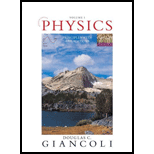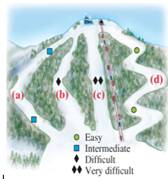
A skier starts at the top of a hill. On which run does her gravitational potential energy change the most (a), (b), (c), or (d), or are they (e) all the same? On which run would her speed at the bottom be the fastest if the runs are icy and we assume no friction or air resistance? Recognizing that there is always some friction, answer the above two questions again. List your four answers now.

The path on which the gravitational potential energy changes the most when there is no friction and the skier will have the maximum speed.
Answer to Problem 1OQ
Solution:
All paths undergo the same amount of gravitational potential energy change. Skier will have same speed at the bottom for all the paths.
All paths undergo the same amount of gravitational potential energy change. Skier will have the greatest speed for the shortest path C.
Explanation of Solution
Force of gravity is a conservative force hence, the work done by force of gravity does not depend on the path but on the initial and final position, since in each path initial and final position is same. Hence, each path undergoes the same amount of gravitational potential energy change.
As the skier travels down, the potential energy converts to kinetic energy. Since the change in potential energy is same for each path, the change in kinetic energy is also same for each path. Hence, skier gains the same amount of speed through each path.
Force of gravity is a conservative force hence the work done by force of gravity does not depend on the path but on the initial and final position, since in each path they are same. Hence, each path undergoes the same amount of gravitational potential energy change.
As the skier travels down, the potential energy converts to kinetic energy and work done by frictional force. the change in potential energy is same for each path, but the work done by frictional force depends on the length of the path. Larger the length, larger is the energy lost to friction. So, only a small portion of potential energy converts to kinetic energy. smaller the length, smaller is the energy lost to friction. So, a large portion of potential energy converts to kinetic energy and skier gains larger speed.
Conclusion:
The change in gravitational potential energy for each path comes out to be same.
The speed at the bottom comes out to be same for each path.
The change in gravitational potential energy for each path comes out to be same.
The speed at the bottom comes out to be greatest for the shortest path C.
Want to see more full solutions like this?
Chapter 6 Solutions
Physics: Principles with Applications
Additional Science Textbook Solutions
Biology: Life on Earth (11th Edition)
Microbiology: An Introduction
Microbiology: An Introduction
Laboratory Experiments in Microbiology (12th Edition) (What's New in Microbiology)
Campbell Biology (11th Edition)
Human Biology: Concepts and Current Issues (8th Edition)
- L₁ D₁ L₂ D2 Aluminum has a resistivity of p = 2.65 × 10 8 2. m. An aluminum wire is L = 2.00 m long and has a circular cross section that is not constant. The diameter of the wire is D₁ = 0.17 mm for a length of L₁ = 0.500 m and a diameter of D2 = 0.24 mm for the rest of the length. a) What is the resistance of this wire? R = Hint A potential difference of AV = 1.40 V is applied across the wire. b) What is the magnitude of the current density in the thin part of the wire? Hint J1 = c) What is the magnitude of the current density in the thick part of the wire? J₂ = d) What is the magnitude of the electric field in the thin part of the wire? E1 = Hint e) What is the magnitude of the electric field in the thick part of the wire? E2 =arrow_forwardplease helparrow_forwardA cheetah spots a gazelle in the distance and begins to sprint from rest, accelerating uniformly at a rate of 8.00 m/s^2 for 5 seconds. After 5 seconds, the cheetah sees that the gazelle has escaped to safety, so it begins to decelerate uniformly at 6.00 m/s^2 until it comes to a stop.arrow_forward
- A projectile is fired with an initial speed of 40.2 m/s at an angle of 35.0 degree above the horizontal on a long flat firing range. Determine. please help and show work for them so i can understand.arrow_forwardpls helparrow_forwardJ K L The graph in the figure shows the position of an object as a function of time. The letters H-L represent particular moments of time. At which moments shown (H, I, etc.) is the speed of the object the greatest? + Position H I K Timearrow_forward
- 1. Two pendula of slightly different length oscillate next to each other. The short one oscillates with frequency 0.52 Hz and the longer one with frequency 0.50 Hz. If they start of in phase determine their phase difference after 75 s.arrow_forwardA mass is connect to a vertical revolving axle by two strings of length L, each making an angle of 45 degrees with the axle, as shown. Both the axle and mass are revolving with angular velocity w, Gravity is directed downward. The tension in the upper string is T_upper and the tension in the lower string is T_lower.Draw a clear free body diagram for mass m. Please include real forces only.Find the tensions in the upper and lower strings, T_upper and T_lowerarrow_forward2. A stone is dropped into a pool of water causing ripple to spread out. After 10 s the circumference of the ripple is 20 m. Calculate the velocity of the wave.arrow_forward
- 10. Imagine you have a system in which you have 54 grams of ice. You can melt this ice and then vaporize it all at 0 C. The melting and vaporization are done reversibly into a balloon held at a pressure of 0.250 bar. Here are some facts about water you may wish to know. The density of liquid water at 0 C is 1 g/cm³. The density of ice at 0 C is 0.917 g/cm³. The enthalpy of vaporization of liquid water is 2.496 kJ/gram and the enthalpy of fusion of solid water is 333.55 J/gram. A. How much energy does the ice absorb as heat when it melts? B. How much work is involved in melting the ice? C. What is the total change in energy for melting the ice? D. What is the enthalpy change for melting the ice? E. What is the entropy change for melting the ice? F. What is the change in Helmholtz energy for melting the ice? G. What is the change in Gibbs energy for melting the ice?arrow_forwardIn the figure Q = 5.7 nC and all other quantities are accurate to 2 significant figures. What is the magnitude of the force on the charge Q? (k = 1/4πε 0 = 8.99 × 109 N · m2/C2)arrow_forwardNow add a fourth charged particle, particle 3, with positive charge q3, fixed in the yz-plane at (0,d2,d2). What is the net force F→ on particle 0 due solely to this charge? Express your answer (a vector) using k, q0, q3, d2, i^, j^, and k^. Include only the force caused by particle 3.arrow_forward
 University Physics Volume 1PhysicsISBN:9781938168277Author:William Moebs, Samuel J. Ling, Jeff SannyPublisher:OpenStax - Rice University
University Physics Volume 1PhysicsISBN:9781938168277Author:William Moebs, Samuel J. Ling, Jeff SannyPublisher:OpenStax - Rice University Glencoe Physics: Principles and Problems, Student...PhysicsISBN:9780078807213Author:Paul W. ZitzewitzPublisher:Glencoe/McGraw-Hill
Glencoe Physics: Principles and Problems, Student...PhysicsISBN:9780078807213Author:Paul W. ZitzewitzPublisher:Glencoe/McGraw-Hill Principles of Physics: A Calculus-Based TextPhysicsISBN:9781133104261Author:Raymond A. Serway, John W. JewettPublisher:Cengage Learning
Principles of Physics: A Calculus-Based TextPhysicsISBN:9781133104261Author:Raymond A. Serway, John W. JewettPublisher:Cengage Learning College PhysicsPhysicsISBN:9781285737027Author:Raymond A. Serway, Chris VuillePublisher:Cengage Learning
College PhysicsPhysicsISBN:9781285737027Author:Raymond A. Serway, Chris VuillePublisher:Cengage Learning An Introduction to Physical SciencePhysicsISBN:9781305079137Author:James Shipman, Jerry D. Wilson, Charles A. Higgins, Omar TorresPublisher:Cengage Learning
An Introduction to Physical SciencePhysicsISBN:9781305079137Author:James Shipman, Jerry D. Wilson, Charles A. Higgins, Omar TorresPublisher:Cengage Learning Physics for Scientists and Engineers: Foundations...PhysicsISBN:9781133939146Author:Katz, Debora M.Publisher:Cengage Learning
Physics for Scientists and Engineers: Foundations...PhysicsISBN:9781133939146Author:Katz, Debora M.Publisher:Cengage Learning





